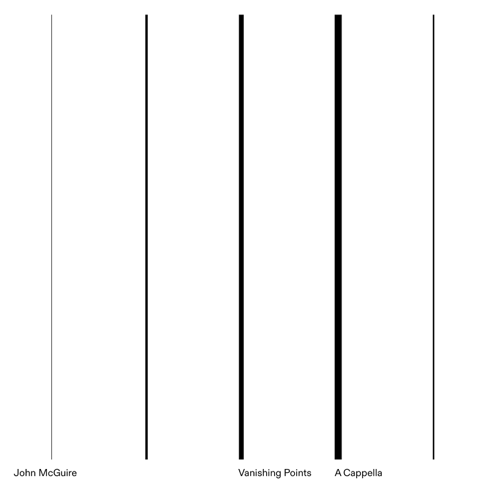1
/
of
1
John McGuire - Vanishing Points / A Cappella LP
John McGuire - Vanishing Points / A Cappella LP
Unseen Worlds
Regular price
$23.98 USD
Regular price
Sale price
$23.98 USD
Unit price
/
per
Couldn't load pickup availability
In his "Pulse Music" compositions of the mid-1970s, composer John McGuire forged a unique interpretation of European serialism. A student of Karlheinz Stockhausen, Krzysztof Penderecki and Gottfried Michael Koenig, McGuire moved to Cologne, Germany in 1970, where he become associated with the world-leading Studio for Electronic Music at Westdeutscher Rundfunk (WDR) in Cologne. Like Stockhausen, McGuire found his musical imagination both constrained and inspired by the technology that was available to him.
A conversation with sculptor Hans Karl Burgeff led McGuire to think beyond the horizon and into limitless space. For "Vanishing Points" (1985-1988), McGuire used an entirely digital set-up for the first time: a digital sequencer, eight Yamaha DX-7 synthesizers and a Studer 24-track digital tape recorder. The piece was conceived as a "sequel" to the Pulse Music series, but also a step forward from it. Whereas the Pulse Music pieces had employed steady streams of pulses, with Vanishing Points McGuire employed pulse layers that accelerate or decelerate against one another, vastly increasing the resulting rhythmic complexity. McGuire's exploration of music technology continued in "A Cappella" (1990-1997), written for his wife, the soprano Beth Griffith, known for her recording of Morton Feldman's "Three Voices" made in 1983. Using samples, he created a four-voice choir of voice samples and arranged them into interacting parts. The composition faced challenges due to the organic nature of the human voice compared to the precision of synthesized sounds. This process involved extensive editing and a negotiation between the "material" and the "original conception". This sort of negotiation applies as much to the composition of a single piece as it does to the work of two decades.Share
Tags: classical, electronic, unseen worlds


